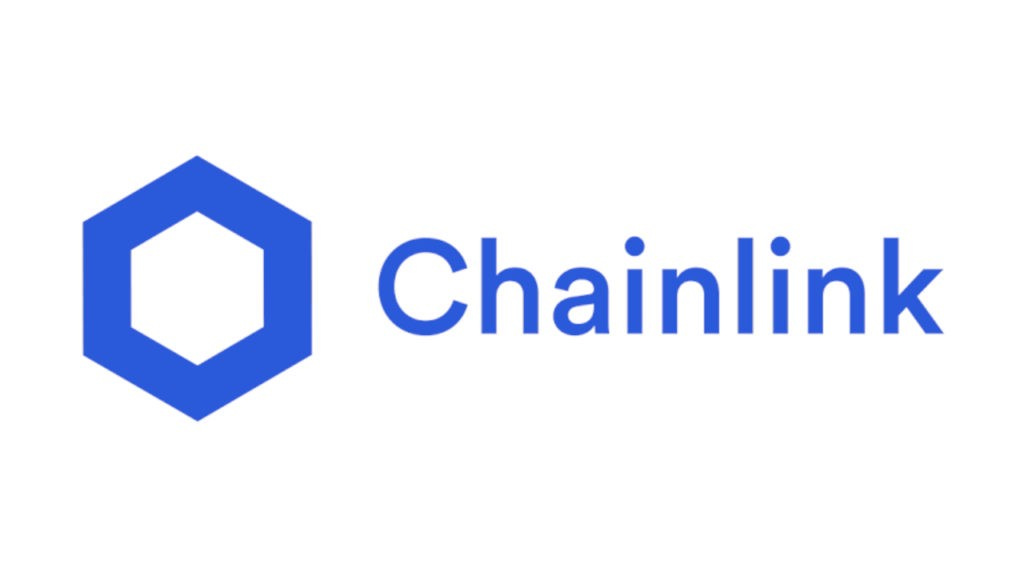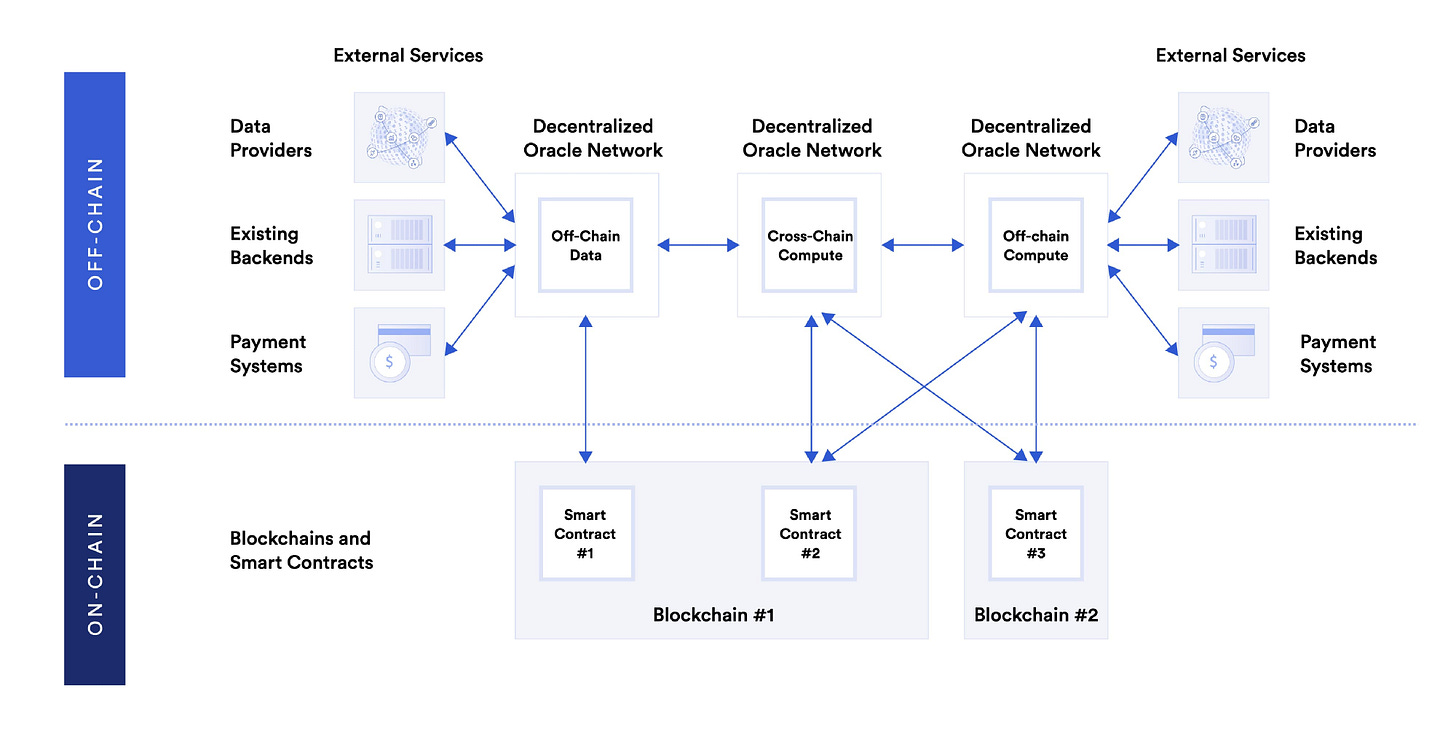A Primer on Chainlink and Oracles
By @0xLayerTwo
A Primer on Chainlink
The importance of smart contracts has increased as the world of blockchain and decentralized finance (DeFi) continues to grow and as more and more use cases are added to the ecosystem. Their implementation enables users to make secure peer-to-peer transactions by removing the need for intermediaries like banks, corporations, or governments. However, without a central intermediary providing the data, developers face the challenge of finding an efficient and practical way to provide smart contracts with the real-world data they ideally need to interface with in order to be able to execute contracts that are practically functional throughout our everyday lives. This data can include eclectic information on matters as diverse as currency prices, weather patterns, flight times, hotel prices, or sports game stats and scores.
For example, let’s assume Adam (thats me) and New York Jets Fan want to bet on the outcome of the Dolphins/Jets game on chain. Adam bets 1 ETH on Miami and NYJF bets 1 ETH on the Jets, with the 2 ETH held in escrow by a smart contract. When the game ends, how does the smart contract know whether to release the funds to Adam or NYJF? As smart as blockchains are, even they can’t just assume Miami won like everyone else knows deep down before the game even started. The answer is that the smart contract requires an oracle to fetch accurate outcomes off-chain and deliver it to the blockchain in a secure and reliable manner. (Go Dolphins).
Oracles provide a way for the decentralized Web3 ecosystem to access existing data sources, legacy systems, and advanced computations. Decentralized oracle networks (DONs) enable the creation of hybrid smart contracts, where on-chain code and off-chain infrastructure are combined to support advanced decentralized applications (dApps) that react to real-world events and interoperate with traditional systems.
This outlines a fundamental limitation of smart contracts; they cannot inherently interact with data and systems existing outside their native blockchain environment. Resources external to the blockchain are considered “off-chain,” while data already stored on the blockchain is considered on-chain. By being purposely isolated from external systems, blockchains obtain their most valuable properties like strong consensus on the validity of user transactions, prevention of double-spending attacks, and mitigation of network downtime. Securely interoperating with off-chain systems from a blockchain requires an additional piece of infrastructure known as an “oracle” to bridge the two environments.
Enter Chainlink
Chainlink is a decentralized oracle network that provides the needed data to the smart contracts that run on various blockchains, rather than having its own native blockchain. Instead, it integrates with multiple blockchains simultaneously, providing them all with up-to-date data streams. It acts not only as an oracle but also as an oracle aggregator. Chainlink purchases information from many data providers, which it then streams directly to blockchains. It is in the data providers’ best interests to only offer up accurate information, as a negative reputation score will result in their removal from the network.
The Chainlink oracle network is heavily relied on by the Ethereum Ecosystem and the dApps that operate within it. Practically speaking, Chainlink’s oracle network acts as a bridge between the off-chain world and secure blockchain environments. The oracles within the network collect, query and validate data from thousands of data sources and deliver it to Chainlink, which then feeds the dynamic inputs to the smart contracts. All of this facilitates a smarter, more connected blockchain ecosystem.
How does it work?
In order to facilitate active communication between the blockchain-based smart contracts it services and off-chain external data sources, Chainlink follows the following steps:
First, Chainlink user drafts what is known as a Service Level Agreement (SLA) specifying a particular set of data requirements. The Chainlink software then uses this SLA to match the user with the most appropriate oracles that can provide the data. Once the parameters are set, the user submits the SLA and deposits their Chainlink (LINK) cryptocurrency in an Order-Matching contract, which accepts bids from oracles.
Next, the oracles connect with the external data sources to obtain the off-chain data requested in the SLA. The data is then processed by the oracles and sent back to the contracts utilizing Chainlink.
The final step of the process involves tallying the results of the data collected by the oracles and returning it to what’s known as an Aggregation contract. The Aggregation contract analyzes the data points, algorithmically assesses the validity of each and returns a weighted score, using the sum of all the data received, to the user (smart contract).
Why Chainlink?
Chainlink is not the only oracle provider within the blockchain space, with other solutions such as Band Protocol, Witnet, Provable, API3 and DIA, amongst others. So what makes Chainlink unique?
The most important quality that sets Chainlink apart lays with how Chainlink was designed, providing a flexible framework for developing and running oracles. Users can enjoy seamless flexibility in creating and connecting smart contracts to customized oracle networks without depending on centralized oracles. Additionally, Chainlink introduces the facility for data signing, meaning oracles on the platform could sign the data they provide to on-chain components. The unique cryptographic signature can help users in verifying origins of the data from specific oracle nodes.
Another key value in relying on the Chainlink oracle ecosystem is the quality of its Data. Chainlink offers high-quality data from premium data providers, which in turn empowers smart contracts with the power of data from external systems and the ability to transmit commands to other systems for specific tasks. Additionally, chainlink is blockchain-agnostic, meaning it can operate natively on any blockchain network without any restrictions, thereby expanding the scope for its adoption.
Finally, the crypto world is very high on Team Strength, and that is something that Chainlink certainly can claim to have. Chainlink benefits from the work of a world-class group of developers. There is also a dedicated team of advisors, some of them from the world's top academic institutions. The Chainlink team includes:
Sergey Nazarov
Nazarov is the co-founder and CEO of Chainlink, having founded the company SmartContract that began the project in 2014, and also having founded the crypto exchange Secure Asset Exchange and decentralized email service CryptoMail.
Steve Ellis
Ellis is the company's Chief Technical Officer (CTO). The software engineer co-founded Chainlink with Nazarov, having worked together on the cryptocurrency exchange project.
Ari Juels
Juels is a technical advisor who helped write the Chainlink whitepaper. He is a computer science professor at Cornell Tech and previously worked as a director at crypto project IC3.
Andrew Miller
Miller is also a technical advisor to Chainlink, holding the same positions at crypto projects Zcash and Tezos. He is a computer science professor at the University of Illinois.
Eric Schmidt
Schmidt has a long history with Google and its parent company Alphabet. He is the former CEO of Google from 2001-2011, executive chairman of Google from 2011 to 2015, executive chairman of Alphabet Inc. from 2015 to 2017, and Technical Advisor at Alphabet from 2017 to 2020. He led the company during its transformation from search engine startup to one of the most important technology companies of all-time, imparting strong business structure while overseeing major victories. Under his leadership, the company launched popular product offerings like Gmail, Google Maps, Chrome, Adsense, and Fiber, and acquired key technologies and services like YouTube and Android. Schmidt considers Chainlink a “secret ingredient to unlocking the potential of smart contract platforms, and revolutionizing business and society”, and hopes to help the company lead the global blockchain revolution.


The LINK Token
Importantly Chainlink is able to validate data from multiple different sources. Thanks to its internal reputation system, Chainlink can determine with a relatively high accuracy which sources are trustworthy, which in turn greatly increases the accuracy of the results and protects smart contracts from attacks. The smart contracts that request the data pay Chainlink node operators in LINK, the native token of the Chainlink Ecosystem, for their service. The prices are set by the node operators based on the market conditions and demand for data.
Node operators also stake LINK to ensure long-term commitment to the project. Similarly to a Proof of Stake consensus mechanism, Chainlink operators are incentivized with LINK rewards to encourage acting in a trustworthy manner rather than being malicious.
Not financial, legal or tax advice. This newsletter is strictly educational and is not investment advice or a solicitation to buy or sell any assets or to make any financial decisions. All opinions expressed are solely those of the individual author. This newsletter is not legal advice and does not create an attorney-client relationship. This newsletter does not constitute tax advice. Talk to your independent attorney and/or accountant for any questions specific to you. Always do your own research and use caution when interacting with smart contracts or the blockchain.



